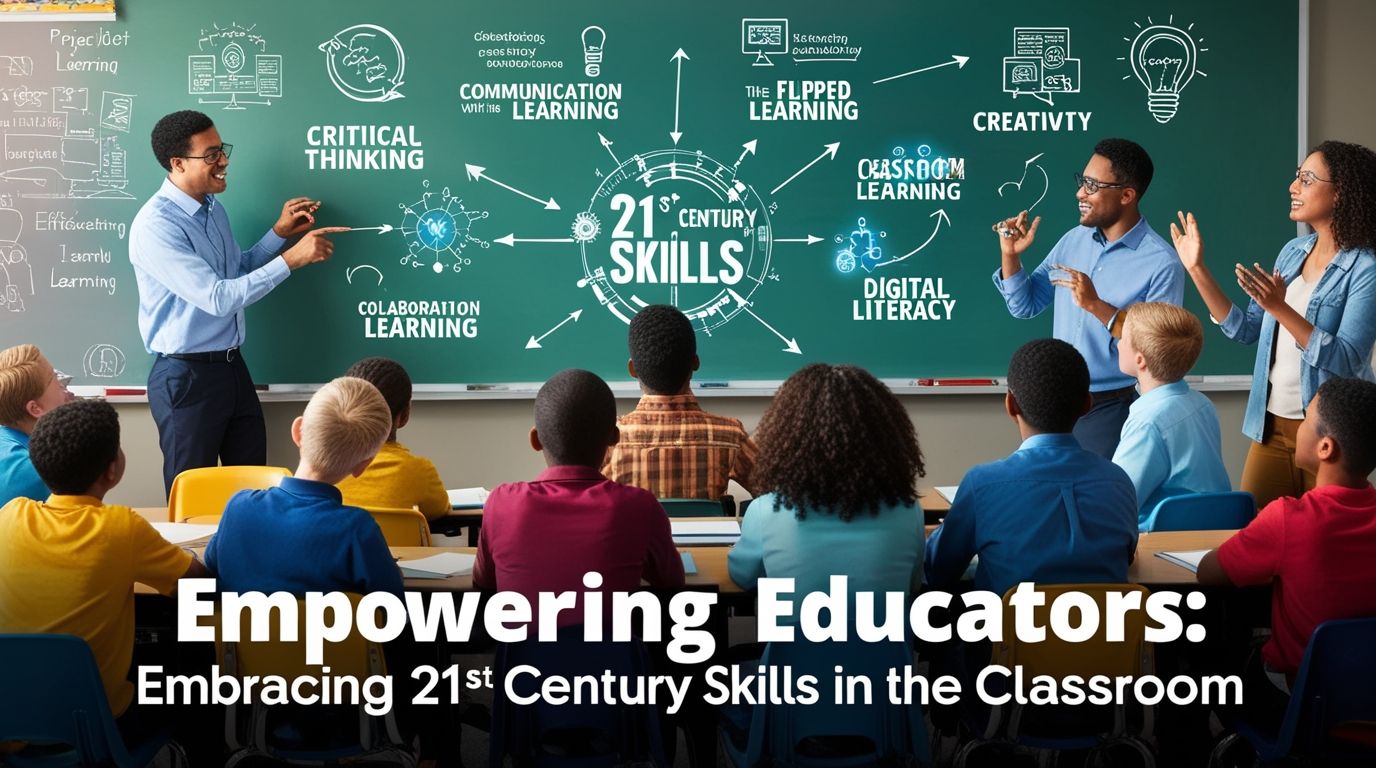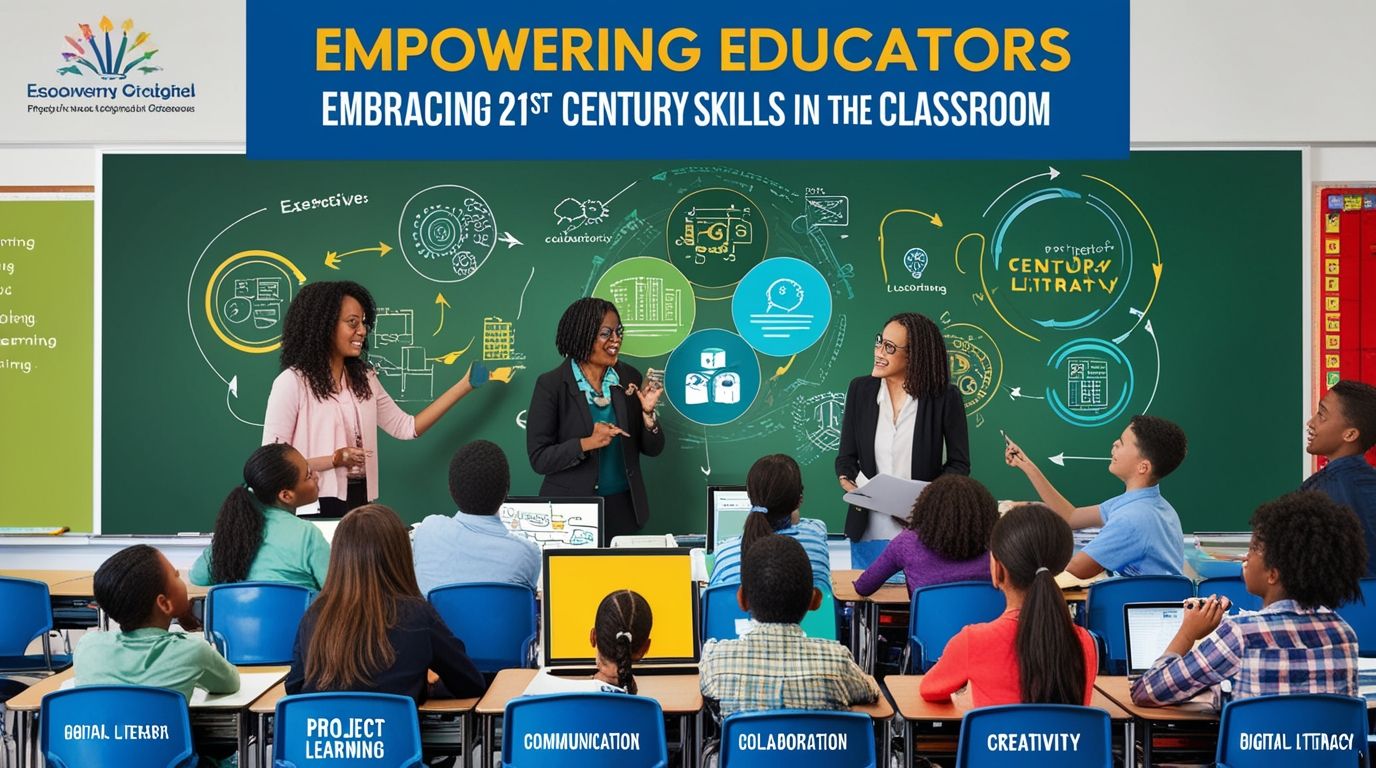Empowering Educators Embracing 21st Century Skills in the Classroom
Empowering Educators Embracing 21st Century Skills in the Classroom the landscape of education is evolving rapidly, influenced by technological advancements, globalization, and the dynamic needs of modern society. To effectively prepare students for the future, teachers must adapt by embracing 21st-century skills. These skills encompass critical thinking, communication, collaboration, creativity, and digital literacy, which are essential for success in today’s interconnected world. This article explores the significance of these skills for teachers and provides practical strategies for integrating them into the classroom.
The Importance of 21st Century Skills
1. Critical Thinking: In an era characterized by information overload, critical thinking is indispensable. Students must be equipped to analyze, evaluate, and synthesize information from diverse sources. For teachers, this means creating a learning environment that encourages questioning, problem-solving, and independent thought. By fostering a culture of inquiry, teachers help students develop the ability to make reasoned judgments and solve complex problems.
2. Communication: Effective communication is crucial for personal and professional success. Teachers must model and teach clear, concise, and persuasive communication across various platforms, including verbal, written, and digital mediums. This involves developing students’ abilities to articulate ideas, engage in meaningful dialogue, and present information coherently. Communication skills also encompass active listening and empathy, essential for fostering respectful and productive interactions.
3. Collaboration: The ability to work collaboratively is a cornerstone of 21st-century education. In a world where teamwork is often required to tackle complex challenges, students must learn to work effectively with diverse groups. Teachers can promote collaboration through group projects, peer-to-peer learning, and cooperative learning activities. By emphasizing teamwork, educators prepare students to navigate and thrive in collaborative work environments.
4. Creativity: Creativity drives innovation and problem-solving. In the classroom, fostering creativity involves encouraging students to think outside the box, take risks, and explore multiple solutions to problems. Teachers can cultivate creativity by integrating arts, design thinking, and project-based learning into their curricula. Providing opportunities for students to express their ideas through various mediums nurtures their creative potential and prepares them for future innovation.
5. Digital Literacy: As technology becomes increasingly integral to everyday life, digital literacy is a vital skill. Teachers must not only be proficient in using technology but also guide students in navigating the digital world safely and ethically. This includes teaching students how to evaluate online information, understand digital footprints, and utilize digital tools effectively for learning and collaboration. Integrating technology into the classroom enhances engagement and prepares students for the digital age.

Strategies for Integrating 21st Century Skills
1. Project-Based Learning (PBL): PBL is a dynamic classroom approach that actively engages students in real-world projects. By working on complex questions and challenges, students develop critical thinking, collaboration, and communication skills. Teachers can design projects that require students to research, problem-solve, and present their findings. This method promotes deep learning and helps students see the relevance of their education to real-life situations.
2. Flipped Classroom: The flipped classroom model inverts traditional teaching by delivering instructional content outside the classroom and using class time for interactive activities. This approach encourages self-directed learning and allows teachers to facilitate deeper understanding through discussions, collaborative work, and hands-on activities. By shifting the focus from passive learning to active engagement, the flipped classroom model enhances critical thinking and problem-solving skills.
3. Collaborative Learning: Collaborative learning strategies, such as group discussions, peer review, and cooperative projects, foster teamwork and communication skills. Teachers can create diverse groups to encourage students to work with peers from different backgrounds and perspectives. This not only enhances collaboration but also prepares students for the diverse work environments they will encounter in the future.
4. Technology Integration: Incorporating technology into the classroom is essential for developing digital literacy. Teachers can use a variety of digital tools and platforms to enhance learning experiences. This includes using educational software, online resources, and interactive whiteboards. By integrating technology, teachers can create engaging and interactive lessons that cater to different learning styles and needs.
5. Socratic Seminars: Socratic seminars are a powerful method for developing critical thinking and communication skills. In these student-led discussions, participants explore complex ideas and texts through questioning and dialogue. Teachers facilitate by guiding the discussion and encouraging students to think deeply and articulate their thoughts. This method promotes active listening, respectful debate, and the ability to construct and defend arguments.
Professional Development for Teachers
Empowering Educators Embracing 21st Century Skills in the Classroom to effectively integrate 21st-century skills, teachers need ongoing professional development. This includes training in new teaching methodologies, technological tools, and collaborative practices. Professional development programs should be designed to support teachers in continually enhancing their skills and adapting to the evolving educational landscape.
Conclusion
Embracing 21st-century skills is essential for preparing students for the future. By focusing on critical thinking, communication, collaboration, creativity, and digital literacy, teachers can create a dynamic and engaging learning environment. Implementing strategies such as project-based learning, the flipped classroom model, collaborative learning, technology integration, and Socratic seminars helps students develop these crucial skills. Ongoing professional development ensures that teachers are equipped to guide their students effectively. Ultimately, by fostering these skills, educators empower students to succeed in a rapidly changing world, preparing them not only for academic achievement but for lifelong success.

uoli0l
I was just seeking this information for some time. After 6 hours of continuous Googleing, at last I got it in your site. I wonder what’s the lack of Google strategy that do not rank this type of informative sites in top of the list. Generally the top web sites are full of garbage.
Informasi akses situs Sigma slot
95ofzq
This all-in-one clock radio CD player is more than just an alarm—it’s a full media hub. Along with a traditional CD player, it features AM/FM radio, Bluetooth connectivity, and a wireless remote control. Dual alarms make it easy to set different wake times, while the large LED display ensures easy readability. With rich stereo sound and multiple playback options, it’s one of the best clock radios with CD player and Bluetooth functionality. Great for music lovers who value versatility in a radio alarm clock CD player setup.
My spouse and i were so peaceful that Emmanuel managed to finish up his web research via the precious recommendations he was given through the weblog. It’s not at all simplistic to just be freely giving strategies that many a number of people might have been selling. Therefore we take into account we have got the blog owner to appreciate for this. Those explanations you made, the simple site navigation, the friendships you help foster – it’s mostly extraordinary, and it’s helping our son in addition to us believe that this issue is cool, which is exceedingly essential. Thanks for the whole thing!
Youre so cool! I dont suppose Ive read anything like this before. So nice to seek out somebody with some unique ideas on this subject. realy thanks for starting this up. this web site is one thing that’s needed on the internet, somebody with a bit of originality. helpful job for bringing one thing new to the internet!
You should take part in a contest for one of the best blogs on the web. I will recommend this site!
Hello! I just would like to give a huge thumbs up for the great info you have here on this post. I will be coming back to your blog for more soon.
You are a very bright individual!
Simply desire to say your article is as astounding. The clearness in your post is simply great and i could assume you’re an expert on this subject. Well with your permission allow me to grab your RSS feed to keep up to date with forthcoming post. Thanks a million and please keep up the enjoyable work.